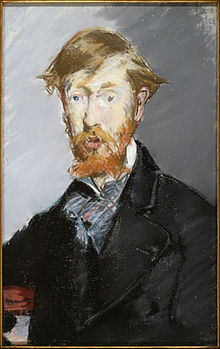George Moore | |
|---|---|
 George Moore by Edouard Manet, 1879 | |
| Born | George Augustus Moore 24 February 1852 Moore Hall, County Mayo, Ireland |
| Died | 21 January 1933 (aged 80) London, England |
| Resting place | Castle Island, County Mayo, Ireland |
| Occupation | short-story writer, poet, art critic, memoirist and dramatist |
| Language | English |
| Alma mater | National Art Training School |
| Period | 1878–1933 |
| Literary movement | Celtic Revival |
| Notable works | Confessions of a Young Man, Esther Waters |
| Relatives | John Moore (granduncle) Maurice George Moore |
George Augustus Moore (24 February 1852 – 21 January 1933) was an Irish novelist, short-story writer, poet, art critic, memoirist and dramatist. Moore came from a Roman Catholic landed family who lived at Moore Hall in Carra, County Mayo. He originally wanted to be a painter, and studied art in Paris during the 1870s. There, he befriended many of the leading French artists and writers of the day.
As a naturalistic writer, he was amongst the first English-language authors to absorb the lessons of the French realists, and was particularly influenced by the works of Émile Zola.[1] His writings influenced James Joyce, according to the literary critic and biographer Richard Ellmann,[2] and, although Moore's work is sometimes seen as outside the mainstream of both Irish and British literature, he is as often regarded as the first great modern Irish novelist.
- ^ Moran, Maureen, (2006), Victorian Literature And Culture p. 145. ISBN 0-8264-8883-8
- ^ Gilcher, Edwin (September 2004; online edn, May 2006) "Moore, George Augustus (1852–1933)", Oxford Dictionary of National Biography, Oxford University Press, doi:10.1093/ref:odnb/35089, retrieved 7 January 2008 (Subscription required)